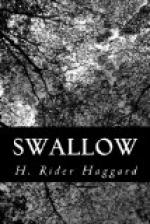No, no, I am not going to write; it is my great-granddaughter, who is named Suzanne after me, who writes. And who that had not seen her at the work could even guess how she does it? I tell you that she has brought up from Durban a machine about the size of a pumpkin which goes tap-tap—like a woodpecker, and prints as it taps. Now, my husband Jan was always very fond of music in his youth, and when first the girl began to tap upon this strange instrument, he, being almost blind and not able to see it, thought that she was playing on a spinet such as stood in my grandfather’s house away in the Old Colony. The noise pleases him and sends him to sleep, reminding him of the days when he courted me and I used to strum upon that spinet with one finger. Therefore I am dictating this history that he may have plenty of it, and that Suzanne may be kept out of mischief.
There, that is my joke. Still there is truth in it, for Jan Botmar, my husband, he who was the strongest man among the fathers of the great trek of 1836, when, like the Israelites of old, we escaped from the English, our masters, into the wilderness, crouches in the corner yonder a crippled giant with but one sense left to him, his hearing, and a little power of wandering speech. It is strange to look at him, his white hair hanging upon his shoulders, his eyes glazed, his chin sunk upon his breast, his great hands knotted and helpless, and to remember that at the battle of Vechtkop, when Moselikatse sent his regiments to crush us, I saw those same hands of his seize the only two Zulus who broke a way into our laager and shake and dash them together till they were dead.
Well, well, who am I that I should talk? For has not the dropsy got hold of my legs, and did not that doctor, who, though an Englishman, is no fool, tell me but yesterday that it was creeping up towards my heart? We are old and soon must die, for such is the will of God. Let us then thank God that it is our lot to pass thus easily and in age, and not to have perished in our youth, as did so many of our companions, the Voortrekkers, they and their children together, by the spear of the savage, or by starvation and fever and wild beasts in the wilderness. Ah! I think of them often, and in my sleep, which has grown light of late, I see them often, and hear those voices that none but I would know to-day. I think of them and I see them, and since Suzanne has the skill to set down my words, a desire comes upon me to tell of them and their deeds before God takes me by the hand and I am borne through the darkness by the wings of God.




